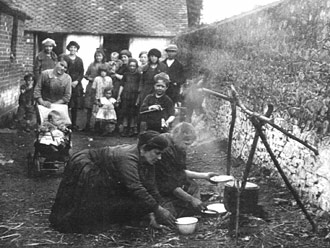What were the health and hygiene problems?
Video clips © BBC
Facilities were basic and hop picking was hard physical work.

What do you think were the problems with so many people living close together?
Unless you were used to living an outdoor life, like the Gypsy Travellers, it could be hard to keep clean with shared toilets, limited water and few washing facilities. Londoners also weren't used to the bugs and creatures of the countryside. Picking hops was hard on your hands and accidents happened quite often.
Read this extract from 'The collected Essays, Journalism and Letters of George Orwell':
2 to 19 September 1931
One soon gets the knack of the work, and the only hardships are the standing (we were generally on our feet ten hours a day), the plagues of plant lice, and the damage to ones hands. One's hands get stained black with the hop juice, which only mud will remove, and after a day or two they crack and are cut to bits by the stems of the vines, which are spiny. In the mornings, before the cuts had reopened, my hands used to give me perfect agony, and even at the time of typing this (October 10th) they show the marks.
The water tap was 200 yards [180 metres] away, and the latrine [toilet] the same distance, but it was so filthy that one would have walked a mile sooner than use it. There was a stream where one could do some laundering, but getting a bath in the village would have been as easy as buying a tame whale.
Does the writer think he has suitable cleaning facilities? Do you think he enjoyed hop picking? What does he think the problems are with the system?
Now read this extract from 'Hopping Down in Kent'
Health was always a problem in the hoppers' camps. Hygiene was primitive to the point of non-existent; food was often very poor - many of the hoppers virtually lived on potatoes, often stolen but sometimes provided by the farmers, and upon food being brought to the hop gardens by London's travelling salesmen. It was never prime quality and was often decidedly neither fresh nor clean, and certainly not wholesome.
There was no piped water, of course, and what water there was either had to be carried quite long distances from the farm well or, more conveniently perhaps, from a nearby pond. There was no guarantee of purity, and a high risk of impurity from either source.
Does the write think the pickers have good food? What are the problems with an unhealthy diet? What does he think of the water supplies? What problems could impure water bring?
This was a fire notice displayed for the hop-pickers.
What did they have to do in case of a fire?

 Previous Page
Previous Page